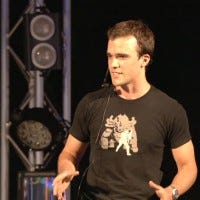
Featured Blog | This community-written post highlights the best of what the game industry has to offer. Read more like it on the Game Developer Blogs.
Meta Valve
Observations from Steam Dev Days

During Steam Dev Days (SDD), the air was positively buzzing with excitement. Developers of all stripes excitedly swapped notes and ideas, fed by the great content that Valve (and other) speakers were disgorging upon us all. The quality of presentations was generally excellent and comfortably eclipsed the general quality at Game Developers Conference. There were many 'takeaways' from the event: At Unknown Worlds, we will no doubt change many plans and practices based on what we have learned during the various sessions. But as good as the explicit messages were, they did not contain the most important information.
Step back from SDD and consider the holistic view. The company hosting and providing the majority of the content of the conference is arguably the most loved, probably the most financially successful, and undoubtedly the most respected single game company on Earth.
Any games company that aspires to lofty heights would do well to listen when Valve speaks. At SDD, multiple Valve employees, the very people responsible for Valve's success, presented not just explicitly in the form of their knowledge but implicitly in the form of themselves. SDD is the possibly the highest concentration of sustained exposure to Valve employees that any other game developer can experience.
Their manner, their attitudes, their dress and bearing, their character, and their priorities were all on show. These attributes are critical because people are Valve's competitive advantage: Gabe Newell has consistently referenced the importance of attracting, retaining and developing top talent to the success of his company. Without exception, every Valve employee on stage at SDD was exceptional. They were consistently impressive individuals, and in that impression lies a substantive explanation for Valve's efficiency and efficacy.
Valve employees demonstrated not just depth of knowledge about their particular topic but breadth of knowledge regarding Valve and game development. Mike Morasky did not just talk about how he creates wonderful music for Valve games, he demonstrated an understanding of how music fits into the development process, and how it affects other elements of the game as a whole. This breadth of knowledge contributes to Valve's ability to produce products of consistently high quality, across all disciplines.
Collaboration between those disciplines is facilitated by communication skills that are evidently a cut above. Every Valve presenter had measured pace, good voice levels and intonation, confidence, appropriate humour, and well-controlled mannerisms. This speaking skill was brought into stark relief when juxtaposed with non-Valve presenters.
In all cases, the delivery of ideas by Valve employees was based in the real world, not their own sense of superiority. They did not 'think' things, they 'knew' things - And if they did not know things, they acknowledged hypotheses as such and never stretched beyond the bounds of inference justified by the knowledge they did have.
Mark Ambinder formalised the phenomenon when he discussed the data-driven decision making process at Valve. The company does not have a structured decision making process, but comprehensive databases are made available to all employees. An absurd number of data are recorded across Valve's properties - At one point, every single bullet fired in CS:GO was recorded! Those that make arguments based on analysis of data naturally win out over conjecture, 'instinct' and other less rigorous decision making methods, As Mark so poignantly put it, the scientific method of hypothesis, observation and analysis has allowed knowledge to be built over the course of human history. Valve employees apply this first principle in their way of thinking.
It would be the most hubristic game company that believes that they too replicate this data-driven and rigorous decision making method. It is not compatible with traditional corporate structures, and I will humbly admit that Unknown Worlds, despite being unstructured like Valve, does not consistently make decisions in a rigorous, analytic manner. Such thinking is not ingrained in the way we go about our daily business, as it so evidently is with employees at Valve.
Another consistent theme across Valve speakers was reference to 'customers.' Not 'players' or 'community,' though those words were occasionally used, but customers. Instead of referencing 'games' or 'services,' they referenced 'products.' How can we improve the product for our customers. How can we create value for both us and our customers. Combined with frequent call-outs to the 'financial' performance of products and the creation of 'value,' Valve employees evidenced their understanding that they are part of a business. So many game companies avoid business terminology, in attempt to present a softer or more 'game-friendly' manner. This is a catastrophic mistake. Valves success as a games and game service developer is entwined at the most base level with its success as a business.
The warmth and openness exuded by Valve employees during their talks was of itself impressive - But even more so when set against their remarkable ability to not talk about topics in an inappropriate way. It is only natural to expect that when a company puts large numbers of its employees on stage, at least several of them will put their foot in their mouth. Gabe Newell alluded to the need for self-restraint when delicately avoiding a question during his keynote address, by describing it as a 'land-mine.' Nathaniel Blue and DJ Powers gave nuanced and considered answers to tough questions about Valves business practices. Mike Morasky was superlatively tactful when baited with a question about an employee that left and then rejoined Valve, deftly deflecting any suggestion of disharmony. It would not be appropriate to describe Valve employees as being 'politically astute,' that could be misinterpreted, but they are undoubtedly consistently diplomatic when asked tough questions.
I could go on and on about these individuals. There are remarkable people in every organisation. What makes Valve remarkable is that their people are consistently brilliant. That has been my primary take-away from SDD. Not the future of VR, Steam Machines, or the expansion of Steam. Instead, the team behind some of the biggest phenomena in gaming has inspired me with their very form, and other game developers that aspire to Valve's success should consider how we can build our own teams to be as effective.
Read more about:
Featured BlogsAbout the Author(s)
You May Also Like













